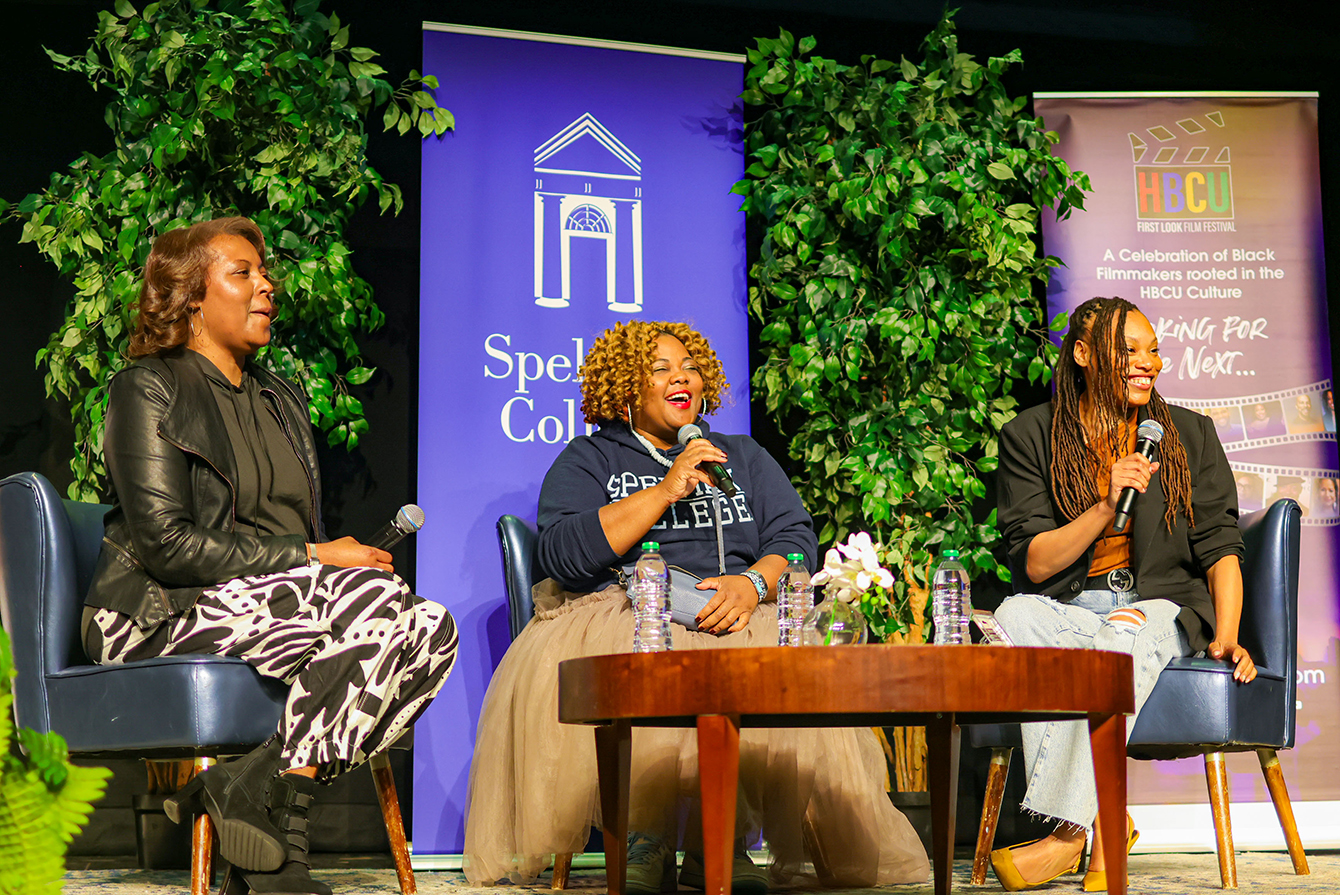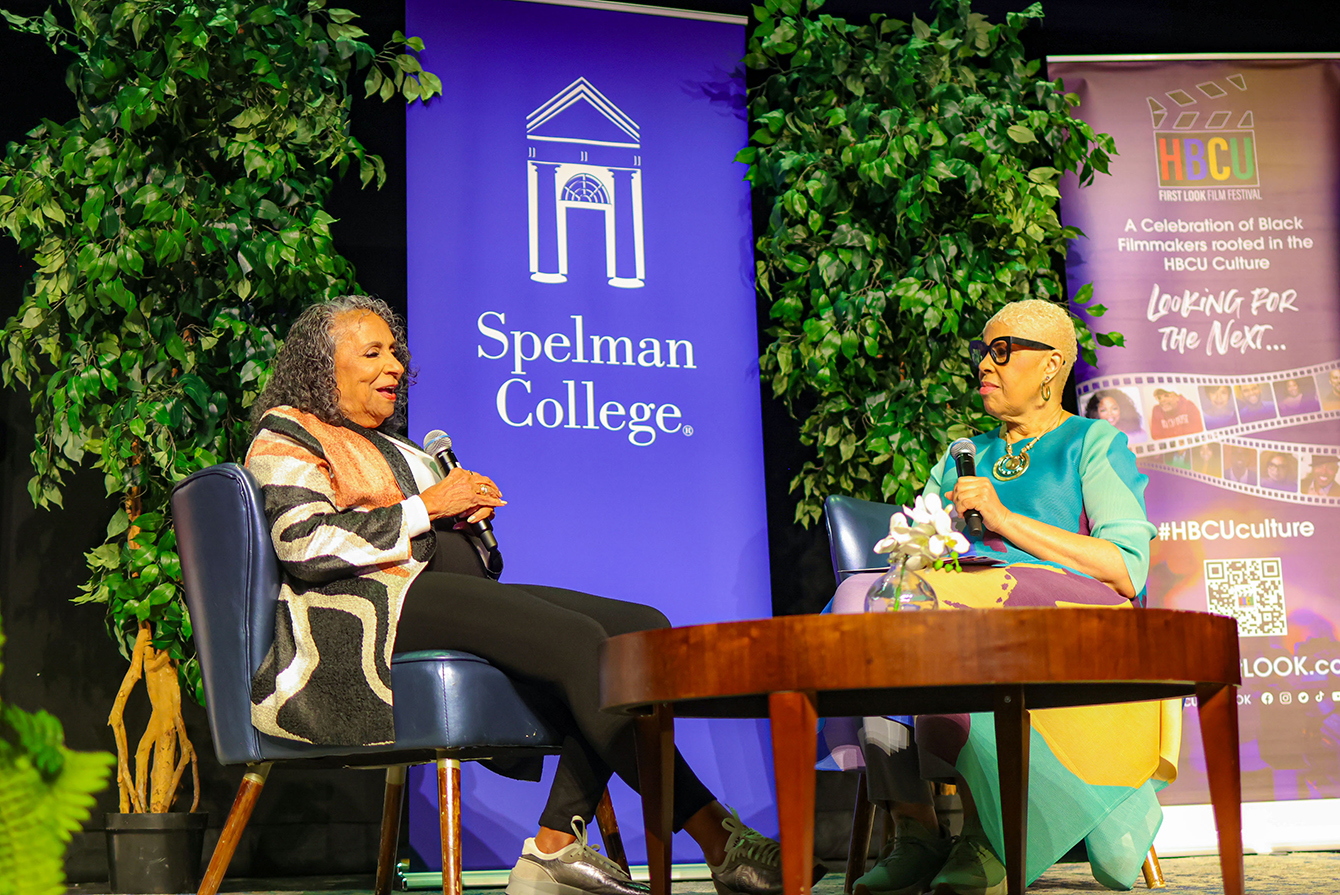Spelman College and the Black Women Film Network hosted a special three-hour masterclass featuring TVOne/RadioOne founder Cathy Hughes on Friday, March 21, in the LaTanya Richardson Jackson and Samuel L. Jackson Center for the Performing Arts in the Rockefeller Arts Building. The masterclass covered topics like mentoring, including the role a mentor can play, why mentorship is important, and how mentees can attain a mentor. The event was open to the campus community and videotaped for the HBCU First LOOK: Let's Talk Series.
Barbara Chirinos, the inaugural artistic director of the Mary Schmidt Campbell Center for Innovation and the Arts (CI&A), gave the opening welcome address. She encouraged attendees to seek mentorship at every level of their lives and careers.
"Think of yourself and your career as museums filled with and getting ready to be filled with experiences, precious arts, and precious accomplishments… Most museums are fantastic; however, your tour of that museum and how you circumvent through it can have more context and possibly be more fulfilling for you should you have a guide or a docent. Mentors do that for you,” they provide guidance," Chirinos said.
 Ronda Racha Penrice served as moderator for the first session for film producers Chiquita Lockley, C’96, and Mercendez Springer. Lockley and Springer shared their experiences beginning in college.
Ronda Racha Penrice served as moderator for the first session for film producers Chiquita Lockley, C’96, and Mercendez Springer. Lockley and Springer shared their experiences beginning in college.
Lockley originally wanted to attend Spelman because of the fictitious television character Claire Huxtable, portrayed by actress Phylicia Rashad from the “Cosby” and “A Different World” show. During her matriculation at the College, Dr. Desiree Pedescleaux noticed her talents and one day, she pulled Lockley aside during constitutional law class and encouraged her to use her creative writing skills more in film and television.
“One of the things I think is so important with our faculty, staff and professors – they look at you, the person, and not just the score that you get or what your grade might be. They actually look at you. She (Dean P.) said, ‘This (constitutional law class) is a bad idea.’ And she was right!” Lockley said. “My department chair routed me somewhere else. At the time, Spelman had one screenwriting class. I took it twice. From there, I was able to – we didn’t have Google at the time – I was able to do some researching, find some classes in the community and I got into Emory. That has led me to this space where I do documentary films. My film is “Eggs Over Easy.”
Lockley’s “Eggs Over Easy” has been licensed on platforms such as Oprah Winfrey’s network, Discovery Plus and Delta Airlines. During her collegiate career, she went on to meet several mentors, including award-winning media professional Sheryl Riley Gripper, C’72. Her networking abilities with Gripper helped her to promote her film “Kunta Kinteh Island” fifteen years later.
“Once (Kunta Kinteh Island) was done, I called Ms. Gripper, and she walked me through every festival I should do. Every radio spot I should do. She kept her word to me. I thought I was special because I was awesome, and she was doing this for me. False. Well, I am special, but Ms. Gripper was helping everybody. And she was helping everybody through the Black Women's Film Network, her baby. That’s the full circle moment of why it’s so important that we come back and do this work and help the next generation. One, Ms. Gripper, helped hundreds of us. What can hundreds of us do to help and mentor the next generation?” Lockley said.
Springer, a Clark Atlanta alumna, taught lessons about integrity and character. She chooses to work on television shows that depict Black people in a positive light. She started her freshman year at 20, neglected her studies, and spent time partying — activities that she now does not recommend. Springer ended up working as a waitress for seven years.
“Don’t discount that,” Springer said. “Every room you’re in now is preparing you for your next room. I was serving as a waitress and asking god why am I not in the profession that I wanted. By the time I got my first job in production as a production assistant, which is usually an entry-level position, the first thing they asked me to do on set was to take lunch orders and coffee orders. God had prepared me literally for my first job in production, and I can do that like the back of my hand – take lunch orders and coffee orders. Everybody got their meal right; everybody got their coffee right. And it propelled me to my next position. They were like, this girl is always on it. They didn’t know that I had seven years as a server. Don’t discount whatever space you’re in right now. Believe me, it’s preparing you for the next room you will walk into.”
Springer also encouraged attendees to network with the person they are sitting next to right now. Many of her friends have helped her get jobs and opportunities.
 Hughes and Shiela Eldridge opened the next session by sharing their stories and experiences of working within the industry. Hughes said her mother, Helen Jones Woods, served as her mentor. In 1937, her mother started an all-female 18-piece orchestra called The International Sweethearts of Rhythm. The band entertained the public and artists like Ray Charles, who mentored Quincy Jones. Hughes lived much of her early life on the road with the band and started her career in newspapers and radio.
Hughes and Shiela Eldridge opened the next session by sharing their stories and experiences of working within the industry. Hughes said her mother, Helen Jones Woods, served as her mentor. In 1937, her mother started an all-female 18-piece orchestra called The International Sweethearts of Rhythm. The band entertained the public and artists like Ray Charles, who mentored Quincy Jones. Hughes lived much of her early life on the road with the band and started her career in newspapers and radio.
While a student at Howard University, Eldridge was inspired by Hughes and her accomplishments. Owning a radio station had been one of Hughes's goals. She had already achieved success in the marketing and public relations business. Hughes turned to Eldridge for advice and mentorship on owning a radio station.
“Cathy replied, “You’re not ready!’” Hughes said. “I collected myself and I went back. I thought about it and prayed on it. If Ms. Hughes says, I’m not ready. I’m not ready. By that time, I had run a successful business for 20 years. Did I have the skills, stamina, knowledge, and relationships it took to own a broadcast property? I didn’t. I dusted myself off and said get over it. And I listened.”
Hughes advised her to go through the program by the National Association of Broadcasters. Eldridge attended the year-long program and went back to Hughes for advice.
“She listened. She didn’t take it personally. One of the things, unfortunately, so many of us do is when we don’t hear the answer that we want to hear or that we think we should hear. We will ghost you. We will stop talking to you. We will stop asking for advice, which is very tragic for young people,” Hughes said. “You are not thinned-skinned because you have been in business. You understood that I wasn’t trying to deflate your ego or hurt your feelings. I was telling you the honest truth based on what I had already experienced. I knew that you needed some additional preparation before you invested the type of money that it takes to buy a radio station.”
Three years later, Eldridge purchased five radio stations from Hughes, located in Augusta, Georgia. The ladies agreed that cultivating positive relationships matters. They proved that peer mentorship is valuable and used the example of how Oprah famously mentored her friend, Gayle King. And now they mentor each other.
 KJ Rose opened the third segment of the masterclass with an "Elevate Your Dreams" motivational session. She encouraged participants to embrace their force. She shared her story and how she battled and overcame debilitating stage fright at the beginning of her career. She started as a background singer for other artists like Heavy D, Janet Jackson, and Justin Timberlake, to build her confidence.
KJ Rose opened the third segment of the masterclass with an "Elevate Your Dreams" motivational session. She encouraged participants to embrace their force. She shared her story and how she battled and overcame debilitating stage fright at the beginning of her career. She started as a background singer for other artists like Heavy D, Janet Jackson, and Justin Timberlake, to build her confidence.
KJ Rose is now the author of “The Rose Effect: Eight Steps to Delivering the Performance of Your Life” and an artist development and performance director. She is also the founder of The Rose Effect, LLC, a Global Stage Consultancy that helps creatives, executives, and artists of all disciplines push beyond their perceived capacity.
“My force is energy. My force is empathy. My force is persistence. And my force is tenacity,” KJ Rose said. “Resurrect your force. Identify a thing about you that you will never negotiate. Reimage yourself. There’s something that only you can deliver.”